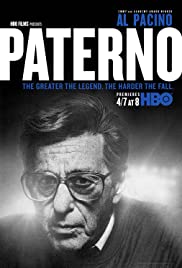
PATERNO
US, 2018, 105 minutes, Colour.
Al Pacino, Riley Keogh, Kathy Baker, Greg Grunberg.
Directed by Barry Levinson.
Joe Paterno is a name that would be familiar to American football fans. He was a successful coach at Penn State for six decades, a statue of him and directed in his honour on the campus, later removed. His name is not familiar to those outside the United States, which means that this film will have a different impact on Americans and non-Americans. And not just because of the football background.
This is a film about the sexual abuse of minors, especially in the context of sport and in the context of youth organisations. This is a true story of Jerry Sandusky, a philanthropist who built up a charity for young people, was hailed by society, was supportive of football and sport. Eventually, the revelations about his sexual abuse.
Joe Paterno was caught up in the eventual revelations. It emerged that he had witnessed or been told of some abuse in the late 1990s, mentioned it to the local authorities, though not immediately. Through the work of a tenacious journalist, Sara Ganim, played by Riley Keogh, Sandusky‘s abuse was revealed in the media. The scandal then touched some of the university authorities who were aware of complaints but had not acted on them. This also touched Joe Paterno, criticism of what he should have done at the time.
Al Pacino plays Joe Paterno with another very vigorous performance though with its subdued moments as some of the impact of the situation came home to him, the film showing various meetings with his children, one son a lawyer, with lawyers, discussing the wording of statements, the meeting of the media. He is supported by his wife, played by Kathy Baker.
The exposure comes almost a decade after some of the events, media exposure, the movement to the courts, indictments of the authorities and criticism of cover-up, Paterno giving testimony to a grand jury. And this touches Joe Paterno, his being rather bewildered by it all, not fully realising the seriousness of the abuse and the need for information being given to the appropriate authorities. He does go out to meet the press. There are huge student rallies in support of him. However, he is fired in November 2011 – and succumbs to lung cancer 74 days later. His hospitalisation with some flashbacks and challenges to his memory and imagination forms the background to the telling of this story.
- The title? The story of Joe Paterno? His significant career? The crisis at the end of his career? Moral issues and decisions?
- An American story, American football, competitions? Colleges and teams? The American audience response? Those outside the US?
- An American story, sexual abuse? Audience familiarity with the case? Those outside the US? The revelations about sexual abuse of minors emerging from the 1990s on? The handling of the situations? Openness? Cover-up? Authorities? Reputations?
- The portrait of Joe Paterno, Al Pacino and his screen presence, forceful performance? The background of his 60 year career, Penn State, his victories, popularity, the statue? The focus on the later games, his observing, comments, with the players? With the managers? But his going into MRI, his illness, the flashbacks, the fantasies, the opening up of the abuse theme?
- Paterno and his family, the devotion of his wife, his children, his son the lawyer, his daughter and her support, the story of the offender at the pool with her children, her challenge to her father? The family meetings, the discussions, the lawyer, planning what to say, meeting the media, careful about word choice and admissions?
- The case of Jerry Sandusky, his reputation, charity work and his empire, the outreach to youngsters, boys? Support of the teams? His continued presence in his organisation and around the sports meetings? The factual information about him, his abuse, the authorities, the challenge, the cover-ups, his social standing, the eventual expose?
- The authorities and Penn State, sports authorities, the 1990s, information given, acting on it or not, motivations, the consequences?
- Joe Paterno, his knowledge of the abuse, his reporting it to internal authorities, the delays, the realisation that he was focused on other matters, his delays? His sympathy? But judgement in retrospect?
- The young man, his mother, reporting to the authorities, his being bullied at school? The opening up of the case?
- The authorities, the discussions, their being indicted, the consequences?
- Joe, the difficulties of the situation? The past and his action and inaction? The times and people trapped in the limitations of their awareness? The meetings, the advice, his meeting the press, his sympathy, the reactions? The students in support? His being fired? The impact? His illness, death?
- The role of the media, Sarah Ganim, her work at the paper, the authorities, her pursuing the case, research, interviews, her personal reaction to the stories? The young survivor and his mother? Her response to Joe? The possibilities of interview? The success of her mission?
- A cautionary story? And its relationship to so many similar stories of sexual abuse of minors?